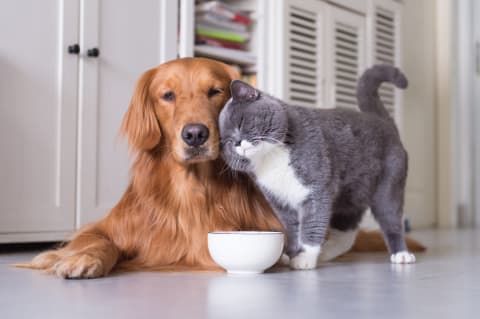What is dog diabetes?
Canine diabetes (dog diabetes) is an incurable disease. It’s caused by either a lack of insulin (the hormone that maintains blood sugar levels) within your dog’s body, or an insufficient biological response to it.
In a healthy dog, insulin would carry the glucose in their food to cells throughout their body. However, if your pooch’s body can’t use insulin properly or produce enough of it, his body won’t be able to use the glucose appropriately.
This results in an increase in your dog’s blood sugar levels and can have negative side effects - which we know as symptoms of diabetes that can include:
- Increase in urination
- “Sweet” smelling breath
- Lack of energy
- Changes in appetite
- Unexplained weight loss
At Animal Hospital of North Asheville, we run a variety of diagnostic tests in our in-house lab when we perform exams. We can create custom treatment plans for your dog based on test results.
After receiving a diagnosis of diabetes, you will likely want to know what food your canine companion should eat now that you’ll need to manage this disease.
Diet management is one of the components of managing diabetes in dogs (along with providing regular insulin injections) and keeping them healthy. As long as this is done diligently, you may be able to enjoy many more years with your pet.
What is the best diet for a dog with diabetes?
Though diet management for diabetic dogs is key and researchers continue to explore the topic, most vets (including us) will recommend a diet full of high-fiber, low-fat foods. While low-fat foods have fewer calories, fiber will help your dog feel full and slow the entrance of glucose into his bloodstream, which will assist with weight management.
We recommend owners focus more on keeping your diabetic dog’s diet consistent, rather than the actual food he eats. Consult your vet for recommendations for high-quality food without simple sugars, which will quickly increase your dog’s blood sugar levels.
All table scraps or treats containing foods high in glycemic (another ingredient that can result in too-high blood sugar levels) - including snacks with lots of sugars such as bread, sweeteners and corn syrup - should be on your ban list.
Tips for a Healthy Diet for a Dog with Diabetes
- Consistency is key. Feed your dog at the same time every day and provide the same amount of food in the same quantity, each time. Ask your veterinarian first before making any changes to your dog’s diet.
- Give your canine friend plenty of water to counteract the fiber in his new diet, since fiber takes water from the body. An unbalanced amount of water and fiber can result in constipation and other issues.
- Ensure your dog stays lean. If your dog is overweight, losing a few pounds may help his cells use insulin more efficiently.
- Don’t give your dog insulin injections if he’s got an empty stomach, as this could make him very sick.
- Has your dog lost his appetite? Let your vet know right away - this could mean he’s experiencing other complications related to diabetes - or just that he doesn’t like his new food.
By giving your dog a consistent high-quality diet and a healthy exercise routine, in addition to tracking your dog’s insulin needs and adjusting these as required with your vet’s help, you can help your dog maintain a healthy life with diabetes.
Do you suspect your dog may have diabetes, or do you have questions about the disease? Our veterinarians can diagnose diseases and conditions, and plan treatments. Contact Us today.

Looking for a vet in Asheville?
We're always accepting new patients, so contact our veterinary hospital today to book your pet's first appointment.Related Articles View All
Your Guide to Cat Rabies Symptoms & Prevention
Rabies is not only fatal for cats, it can be passed from our feline friends to us! In today's post, you will learn how rabies is spread, what makes it so deadly, what symptoms to look for, and how rabies in cats can be prevented.
Tooth Resorption in Cats
Is your cat reluctant to eat, drooling or showing other unusual behaviors? If so, it could be due to painful tooth resorption. Our North Asheville vets explain the signs to watch for and how tooth resorption can be treated.
Inflammatory Bowel Disease in Dogs, Life Expectancy
At Animal Hospital of North Asheville our vets often treat dogs with inflammatory bowel disease (IBD), and while there is no cure for this condition, in many cases IBD can be managed successfully. Here we look at the prognosis for dogs suffering from IBD.
What is hip dysplasia in dogs? How is it treated?
Hip dysplasia is a condition characterized by the abnormal formation of one or both your dog's hips leading to pain when exercising or changing position. Here our North Asheville vets explain more about hip dysplasia, its symptoms and the surgeries used to treat this condition.
